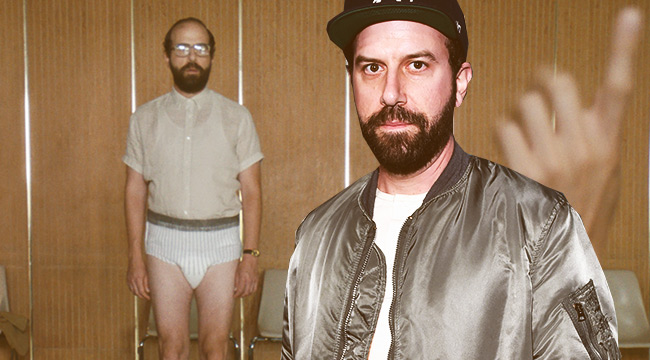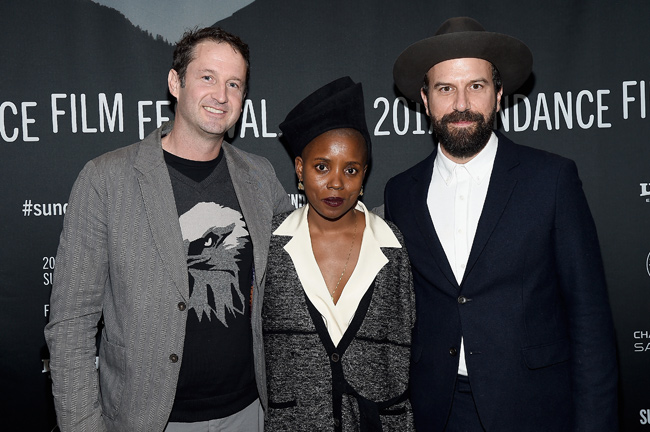
Brett Gelman has made me laugh harder than almost anyone else in the world, yet when I meet him, he seems very serious. Which seems oddly fitting. How do I square these two impressions? Is it too opposite world, too journalism-cliche paradox to say that it’s partly this facade of seriousness that makes him so hilarious? Whatever, it feels true.
I met Gelman in the same Sundance lounge where I talked to Jack Black a day earlier. Black showed up in a baseball hat and puffy jacket, looking like he’d just rolled out of bed and spent the first five minutes busting my balls about my sound recorder. Gelman, by contrast, is wearing a broad-brimmed, chocolate colored hat with an expensive-looking texture that suggests he bought it from a place that actually had “haberdasher” in the title. He’s pulling it off too. This balding guy from the movie where he plays a shabby loser, he looks downright glamorous. Like a real-live movie star from the movies! I’ve always admired guys who can pull off unusual hats. How do they even do it? Pulling off a fancy hat takes commitment. For guys like me they always end up feeling like a costume, visual evidence that I’m a fraud.
Anyway, rather than sink into his chair and bullshit about audio recorders and the Beastie Boys, Jack Black-style (no shade on either guy, I greatly enjoyed talking to both of them), Gelman is every inch the scholarship kid. He’s done his homework and he’s ready for the test. He’s even prepared to discuss influences.
“I saw A Night at the Opera, this Marx Brothers film, when I was like six years old,” Gelman says. “I just became obsessed, you know? I started watching a lot of the Marx Brothers, a lot of Chaplin, a lot of Mel Brooks movies, a lot of Peter Sellers, and grew up with Bill Murray and Eddie Murphy, watched a lot of the original cast of Saturday Night Live and their movies. That was really my first huge influences. Also the actors in all of Mel Brooks’ films, from Madeline Kahn to Cloris Leachman, to Harvey Korman.”
That is, simply put, a really good answer — a succinct yet detailed snow-globe auto-origin story, of the kind I could never imagine having for myself. Am I somehow disappointed that a guy who makes me laugh as hard as Gelman does can be this articulate about it? I don’t think so, but it does make me forget my question about the scene in Lemon where his character ends up with his own shit in his hands. I really did want to ask about that.

(from left, producer Trevor Goth, Janicza Bravo, and Gelman)
I’ve heard it said that obsession is the root of all comedy. I’m not sure I entirely believe that, but I do think there’s something to the idea that people are funnier when they’re willing to risk not being funny. When they’re willing to hold onto an idea so tightly that it might not even be a joke. That’s the way I felt watching Lemon, the movie directed by Gelman’s wife, Janicza Bravo, who co-wrote the film with Gelman. It’s a movie that doesn’t seem to care whether I’m laughing, which only makes me laugh harder.
“We didn’t really set out to make a hilarious movie,” Gelman says. “We both kind of believe that you approach moments with full craft, full truth in where the character is. You do that organically, and if it comes out funny, great. If it doesn’t, great, as long as it’s really intense. We weren’t doing joke passes on this script, but at the same time — and this totally contradicts what I just said — we were in full knowledge that we were making a dark comedy.”
I’m not even sure if Lemon is dark, exactly, it’s more just… obsessive. A lot of comedy just skims the surface of its subject matter, hence the word “light.” Lemon burrows deep into it, and in the process, finds jokes that hit you even harder. I don’t know how you pitch that, or sell that.
“A lot of people said no,” Gelman says. “Most people said no.”
According to Gelman, it took five years to get Lemon made. This despite him having been on a million TV shows — a not-complete list includes, Curb Your Enthusiasm, Bored to Death, Funny or Die Presents, The Office, Eagleheart on Adult Swim, Comedy Bang! Bang!, The Kroll Show, Bad Teacher, The Inbetweeners, The League, Love, and the upcoming Twin Peaks reboot.
I ask Gelman if he’s buying my description of Lemon as Philip Roth directed like Napoleon Dynamite. How would he sell it?
“I think it’s good for film. I think it’s a real film. I don’t know,” Gelman says. “I just feel like a lot of stuff looks and feels the same, and is about the same things for the most part, and isn’t coming from the perspective that Janicza is coming from. All of my favorite directors are coming from a singular perspective, and I think that’s been very lacking in film. I’m really proud to be a part of this movie. I’ve never been prouder to be a part of anything before, because I think that it’s a really original film, but not in an alienating way. You know? I guess my pitch would be, ‘You should buy this because it’s good for cinema,’ to show people that it’s not just, ‘Put the camera here, and say whatever you want.'”
It’s the kind of answer that might sound pompous if I’d heard it from anyone else about almost any other movie, but in the case of Gelman and Lemon, I happen to agree 100% (it’s also probably easier to brag on a film directed by your significant other than it is to brag on your own). It’s a movie that’s art first and comedy second — which amplifies the comedy, actually. The catch 22 being, comedy is art in a form people seem resistant to think of as art.
“I think comedy is incredibly discriminated against,” Gelman says. “It is one of the most enjoyed, yet most condescended art forms in the world. It’s the same thing with hip-hop. People for some reason, because it immediately connects to the deep part of you in this way, and because it potentially even alleviates something inside of you, that it’s somehow not taken as seriously as drama, or songwriting. Why they don’t consider people like Nas a songwriter is crazy. The same way that until recently, it wasn’t until the last ten years that people started to celebrate Bill Murray for the actor that he is. You know? It’s a very strange thing. I think that even though this is a very funny film, it’s a very serious film. It’s a seriously done film.”
It is. Paradoxically, Lemon is funny because it isn’t f*cking around. The same seems true of Gelman. Or at least, you’re never sure if he’s f*cking around. He always has that glint in his eye. His iBrain segment on Comedy Bang Bang! is possibly the hardest I’ve ever laughed at a comedy bit. But (consisting as it does of Gelman literally reading a story he wrote) it also stands out as possibly the least improvisational bit in the history of the show, which is ostensibly dedicated to improv. I wanted to ask Gelman about his voice, its magical quality of making anything he says funnier. Maybe he’d have some insight into it? A funny story?
“I think that’s training,” Gelman says. “I actually think that that’s something that’s lacking in the thinking of a lot of actors, is language, and how you deal with language. One of the things I was taught was how you deal with language. It’s important, very important in comedy. I think a lot of times people put too much stress and rely on improvisation too much, when it’s like, you should really know how to make this work.”
I don’t know if I’m ready to believe that Brett Gelman having a hilarious voice is all due to Brett Gelman’s training, and isn’t at least in some small way the result of cosmic chance. But I believe Gelman believes it, and that’s why it works. True believers are always funnier that way.
